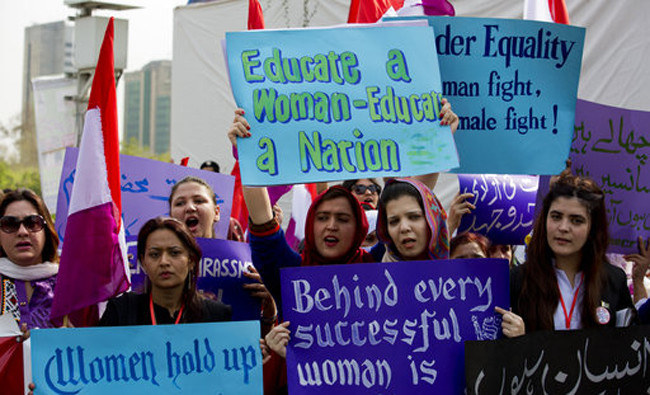
Molana Ashraf Thanvi (1868-1943) preached regressive approach through his writings to confine women within the four walls
By Sidra Shaikh
People often say that a person who hears the word “no” the most in their life is usually a woman. Women are often limited to traditional roles of being a mother, wife, sister or daughter, with limited opportunity. It seems as though they are not given the right to live their own lives but are expected to switch roles between being a mother, daughter, sister or wife as society dictates.
We are living in a so-called Islamic society where Islam is not just followed, but rather used as a tool. Especially In case of women, the men tend to interpret Islamic teachings in a way that limits women’s rights.
A man can have 4 marriages because Islam gives him the right, but a woman cannot choose or prefer to have only one life partner for herself. No one talks about the rights Islam has given to women regarding marriage. The society we refer to as a male-dominated society was not created by someone else, but by us. We have always kept men dominant over women, and a big part of this is the feudal mindset that drives the gender inequality.
Unfortunately even in 21st century, we revolve around the same ideas of Molana Thanvi
The reason for gender bias in our society is not Islam’s teachings, but rather the mindset that has been passed down through generations in relation to the inherited patriarchal system. Every religion in the world promotes equality and harmony. It cannot be the cause of discrimination or unequal treatment, and this exactly goes with the Islam but it’s we, who have made it very liberal for one gender and very restrictive for other. It is a peaceful and egalitarian religion. It’s just that some people have misused it for their own agenda, causing difficulties for women.

Women are consistently undermined and their contributions to history are overlooked
The fault lies in the historical narratives, traditions, and the control imposed on that gender which has never been seen in the case of women. As we have the presence of Hazrat Ayesha in the Battle of Jamal and Khawla bint al-Azwar in the Battle of Yamama. And the women like Jahanara Shahnawaz, Shaista Ikramullah, who were present in history and worked tirelessly in the scorching heat to raise awareness and empower women in the struggle for an independent state of Pakistan. The point is that these women were present in history, but their contributions are not adequately expressed.
Men are often praised for their performance, but women’s participation is not acknowledged. Whenever an opportunity arises, women are consistently undermined and their contributions to history are overlooked.
Islam talks about justice and equality but unfortunately, there are some who have restricted it for their own benefit, limiting women’s personal, psychological, and social progress by imposing narrow interpretations. These interpretations hinder women from fully participating in various aspects of life.
Also read: Perpetuation of gender discrimination in Pakistani society
In history, an eminent religious scholar Molana Ashraf Ali Thanvi (1868-1943) through his writings aimed to revive the declining male-oriented feudal system.
During the 19th and 20th centuries, when the sun of Western education was rising rapidly, Molana wrote a book “Bahishti Zewar” (Heavenly Ornaments) to reduce the dominance of Western education, especially on women by taking religious and moral support, to prevent women from seeking change and fighting for their rights. The book primarily addresses women and offers guidance on various aspects of their lives, including religious, social, and domestic matters.
While writing this book, Molana applied a formula of using religion to only focus on those principles that benefit men. This book was considered an excellent remedy for providing complete peace and happiness to men from a woman’s side.

Ashraf Thanvi believed that women should only read religious books that focus on the rights of spouses
In this book, Molana described various methods and tools for women to become good servants with great skill. On the other hand, he emphasized the importance of men acquiring Western education. For women, he not only limited their education to religious teachings but also restricted it to a very limited extent, discouraging their desire for higher education.
Ashraf Thanvi believed that women should only read religious books that focus on the rights of spouses, instill fear of hell, guide women, provide advice, promote faith, and include admonitions of the prophets.
According to the Molana, women should not even read all religious books. Surprisingly Molana used to restrict women from reading the religious books like “Ma’ajizah Al-Nabi”, “Naqsh-e-Sulemani”, “Jangnama Hazrat Ali”, and “Tafseer-e-Yusuf”. The reason was that these books contain fictional stories that according to Molana, negatively influence women’s minds.
Molana restricts women strictly from novels or stories. He advises women to stay away from worldly activities and focus on domestic matters. He further suggests that women should only have an interest in domestic things and considers reading newspapers a waste of time.
In our society, the concept of modesty is often associated only with women, while men feel entitled to stare at women
The philosophy of Molana Thanvi took the very patriarchal and regressive approach to confine women within the four walls of their homes and unfortunately still in 21st century we revolve around these same ideas. Even we still see a reflection of a feudal society where women are not given any property rights, and instead, women themselves are often defined as the property of men.
In our society, the concept of modesty is often associated only with women, while men feel entitled to stare at women. This is because they believe that modesty and shame are only for women. Even if a woman dresses modestly, men may still look at her inappropriately. However, when a woman is confident and empowered in her actions, it can discourage men from objectifying her.
Read more: Male Dominance over Female in Pakistan
In all these scenarios, if we take a step back, it becomes clear that in matters concerning women, our society tend to use the religion always in the favor of men for every single right and privilege. This is because we live in a so-called male-dominated society. Karl Marx once said, “Religion is the opium of the masses,” and I feel that this statement resonates in our society.
In our Pakistani society religion is used to control people and influence their thoughts and actions especially in context of women. In this way, Karl Marx’s statement “Religion is the opium of the masses” relates to our society because we understood religion as a drug for the masses.
____________
 Sidra Shaikh is BS third-Year student of anthropology at the Department of Anthropology and Archaeology, University of Sindh, Jamshoro, Sindh Pakistan
Sidra Shaikh is BS third-Year student of anthropology at the Department of Anthropology and Archaeology, University of Sindh, Jamshoro, Sindh Pakistan
[…] Read: Navigating Gender Roles, Religion, and Patriarchy: Women’s Rights in Pakistani Society […]
[…] Read: Navigating Gender Roles, Religion, and Patriarchy: Women’s Rights in Pakistani Society […]